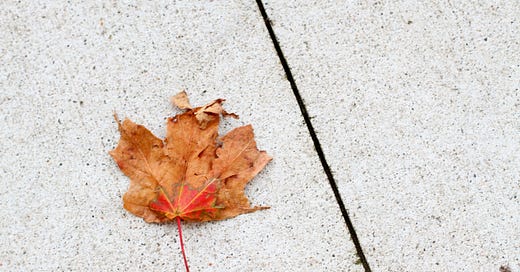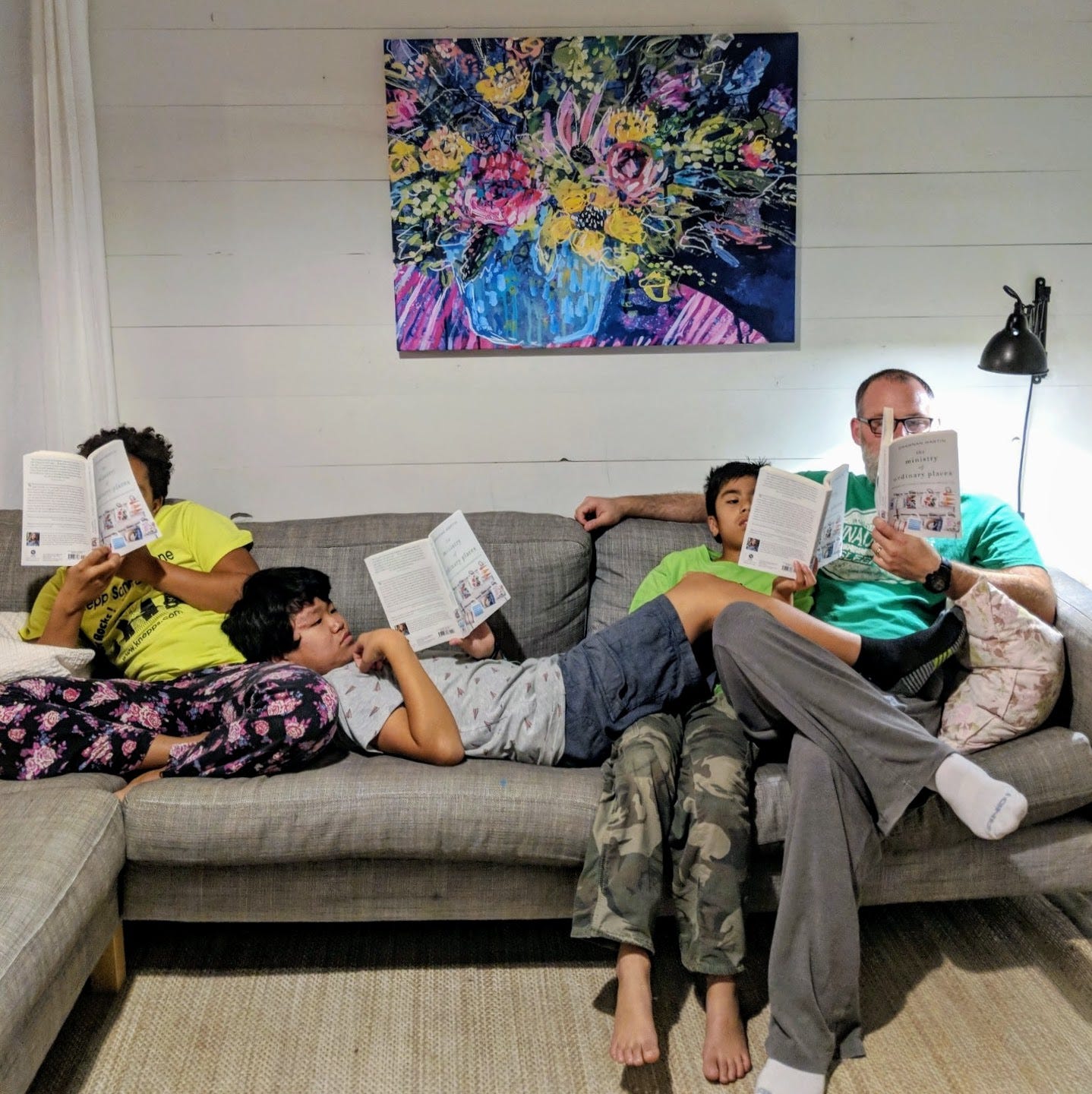I used to be terrified of change, as evidenced by the quote I taped to the wall of my cubicle at The Heritage Foundation in 2003: “If you open your mind, your brain falls out.” (sigh)
I spent all eight months of my tenure1 inside that building feeling like an imposter. Everyone was so glam, with their orthodontured smiles and East Coast accents. They’d graduated from top schools. They were effortless. Mannered. They carried the “it” bag. (They knew it was cooler to say they “wore” it.) They thought it was insane that I married so young. They summered.
I knew I could never be like them. But I could definitely think like them. And what was the glory of a shared ideology if it wasn’t worn on your sleeve, like a Luis Vuitton “Speedy”? Maybe the price of belonging could be bartered down to a single sheet of printer paper and a 90-point font.
~
In addition to adhering to relentless purity standards (or at least effectively pretending to,) the moral code required of a 90’s Midwestern Good Christian Girl included two things:
absolute loyalty to the system and its heroes
unwavering certainty
To remain in honorable service, I enlisted in a range of tactical operations, including Awana sword drills (iykyk) and Bible quizzing, where we would compete in quoting entire chapters from Paul’s epistles. I was subtly yet routinely terrorized by the specter of apologetics debates. “Always be ready to defend the faith”. (Not your faith, the faith. There was only one acceptable version.) Since I had no real clue why I believed what I “believed,” and because voicing doubt was frowned upon, it was clear the safest option was to encamp with other Good Christian People, eliminating any threat of battle.
And it really was safe. My childhood was simple and sweet. This might be difficult to imagine, but no one in our circle cussed or drank alcohol, not that I knew. People didn’t get divorced. The boys kept their hair trimmed to a respectable length. Us girls made sure the hems of our shorts reached our fingertips, a true feat of moral rigor for someone with my wingspan.
These were working-class people. Charitable people. (White people.) Really lovely people. Good Christian People. So, it was confusing when some of them would unleash their meanness on a single, largely invisible, almost-mythical group - “the Libs”.
I remember redemption stories about drug addicts, gang leaders, adulterous women, rebellious teens, and Ivy League atheists. The same people rejoiced when Ted Bundy found eternal salvation in prison. For all have sinned! But I don’t recall thunderous applause for prodigal Democrats, no tears of rejoicing shed for wayward “communists.”
They were evil. Immoral. They wrestled prayer from public schools with their oily hands - this was a very big deal. When I remarked that we had never, not once, prayed together in elementary school, I was told it was about the principle. Where would it end?! Liberals would stop at nothing. They were probably the ones Jesus referred to when he told his disciples to “shake the dust from their feet.” Steer clear.
All of this to say, there are plenty of people who see my political evolution as “back-sliding,” or worse. As sure as I type these words, I have been added to prayer lists, unfollowed and distanced, as if I’m contagious.2
They tried to warn me when we moved to the city. It happened in spite of their grave exhortations and my own worst fears. I blame my neighbors, who disproved the theory that “difference” was dangerous. Just one taste of this delicious complication and all bets were off.
As we spiral toward a monumental Presidential election, it’s impossible not to reflect on my personal progression, especially since this anxiety-ridden season coincides with the anniversaries all of my published books.
Falling Free (8 years!)
The Ministry of Ordinary Places (6 years!)
Start with Hello (2 years!)
For the past thirteen years, to my delight and gratitude, I’ve been incrementally saved from my addiction to certainty, redeemed daily daily from superiority and judgment. I am a seminarian of these streets, discipled by incarcerated people, pastored with integrity by unhoused people, loved by newcomers to this country and several employees of the local Dunkin’.
This I know.
For I am sure I will see the Lord’s goodness while I am here in the land of the living.
Psalm 27:13
Writing books always feels impossible. But once they’re out in the world, it’s a different story. I look back and see movement, not chaos. I see curiosity, not a flimsy commitment. I understand that as I move toward the people around me, I am moving toward God.
It’s wild to stare at these fifty-thousand-word snapshots and not recognize how this singular, ordinary life continues to undo me.
Liberation is disruptive.
It has contextualized my faith, given it heft and grit.
It has informed my politics. (I can never unknow the political nature of daily life.)
For all these years, I’ve kept a written record of God relentlessly showing up disguised as my neighbors. The spines of my books carry the stories that still make me cry. My journey is plotted on the pages, every ending a new beginning. I’m grateful to be able to share it with you. (It might help make sense of some things.)
In honor of my three bookiversaries, I invite you to celebrate geek out with me over their respective closing words, mostly because - and this is something I didn’t know until this very moment - all three of my books end on page 210. (!!!!) (Do I have a new lucky number?) (Did you know I was not allowed to use the word “lucky” as a kid?)
“God’s love for us is a wheel that keeps turning, a cycle of capture and release. He gives and takes; we receive and pass it on. We are so much better together here, in this long-strung tension between what we think we deserve and the wild grace we’ve been given. This is who God is. This is how he loves us.”
- Falling Free (2016) page 210
“What I know now is that sometimes the best thing we can do for the world we’re in is let our roots keep growing with no regard to the climate. We sleep. We work. We bloom. We light up the world.”
- The Ministry of Ordinary Places (2018) page 210
“We don’t pursue connection because we know it will be easy. We pursue connection because we believe it multiplies our possibilities for wholeness. We believe the opposite of lost is free. We believe we can’t be free on our own so we reach out, grab tight, and hold on for dear life. To this we will testify.”
- Start with Hello (2022) page 210
If you’d like to celebrate with me:
Buy copies using Amazon links (above) or Bookshop links (below)
Leave a review! If you’ve already read and enjoyed them, it’s never too late! (For boring reasons, positive reviews are super helpful to authors.)
Start with Hello and Falling Free are both part of Amazon Prime’s “Get 3 for the Price of 2” deal! Check out all of the qualifying books (all 3 must qualify) HERE.
If you have a favorite, I’d love to hear about it in the comments!
Thank you for your kind presence and support. I think you’re amazing!
Love,
Shannan
We expected to be in DC for at least two years but Cory mucked up the plan by being promoted to a position back in the Indiana district office. When I told my notoriously cranky boss at THF he said “I’m heartsick,” which remains one of the best compliments of my life. He pulled strings and allowed me to continue working from home, long before we knew the term “working remotely.” I did so with dial-up internet. (insert melting face, it was a different time)
To be clear, I am grateful for my upbringing. We’re all products of our teaching and the people near us, shaped by fear and regrets. We do the best with what we’ve been given. And we’re all afraid of something.









Looooove this: "I am a seminarian of these streets . . ."
You cannot make me choose a favorite book ... it's like picking a favorite child. All of them have quietly, forcefully undone me, making me examine my easy habits and assumptions from more complicated, compassionate angles.
This, though: "a true feat of moral rigor for someone with my wingspan." I am dying. :D